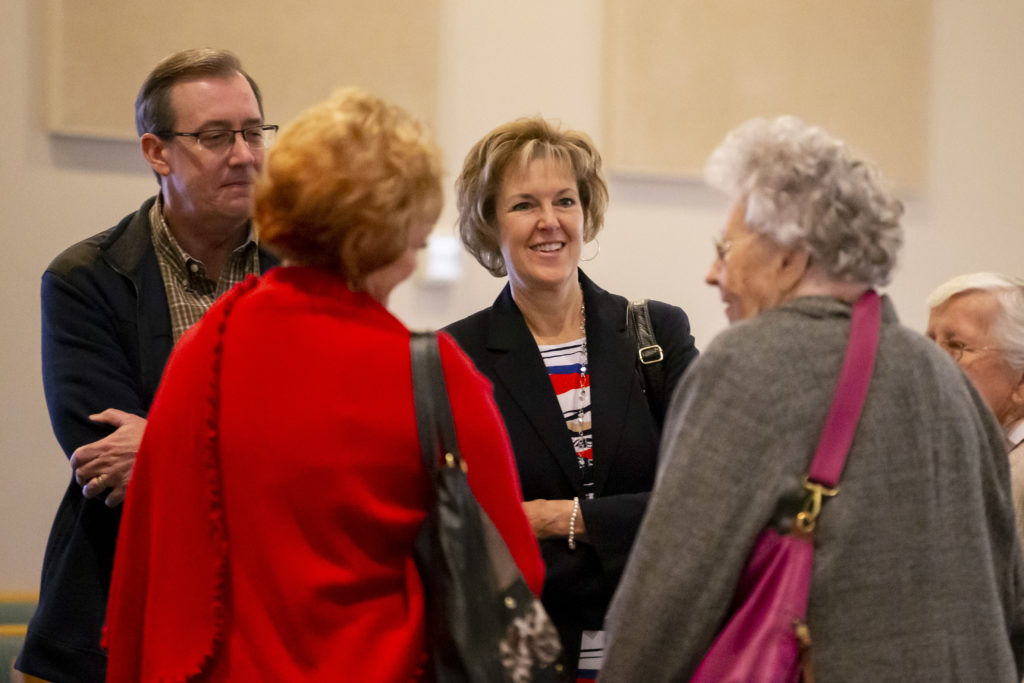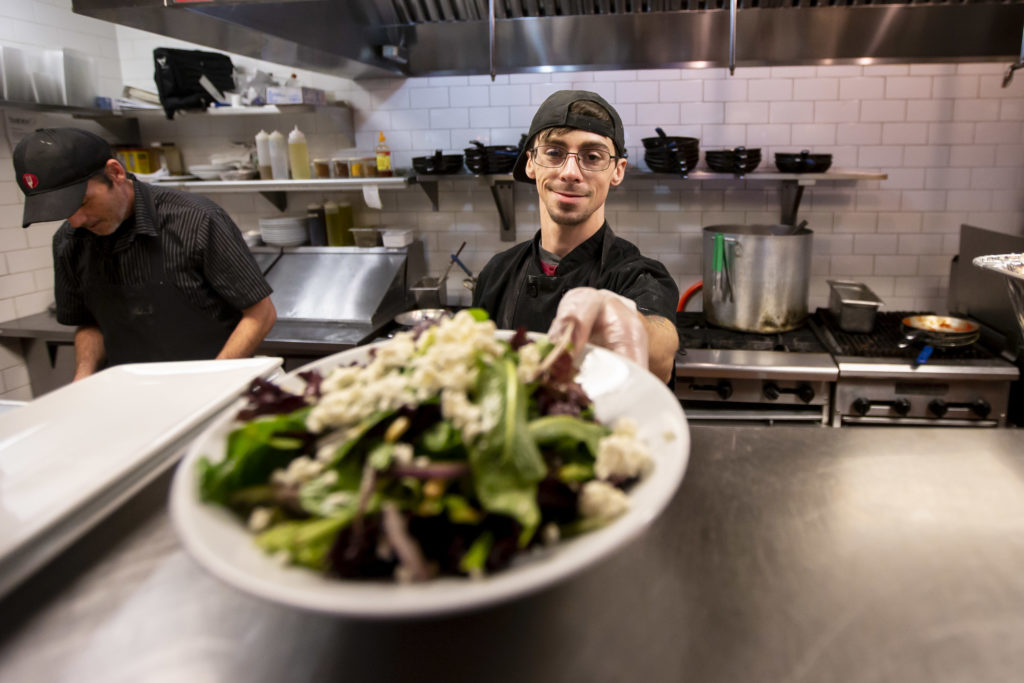
How are those New Year’s resolutions?
As 2019 kicks into gear, Wrangler News interviewed primary care physician Matthew Khumalo about ways to stay healthy, then set out to find folks in our area who are doing just that.
The Tempe St. Luke’s- affiliated doc emphasized the importance of social connectedness and interacting with others; participating in regular exercise, as did women working out at MegaFit in West Chandler; and seeking healthy meals, as demonstrated by this chef at Babbo Italian Eatery who finesses a salad with fresh ingredients.
Our team met with Gerry Lee, fitness expert and owner of MegaFit studio, who overcame multiple sclerosis, and visited with members of Arizona Community Church in Tempe as they chatted with one another following Sunday morning services.
— Photos by Billy Hardiman for Wrangler News
By Sammie Ann Wicks
Ben Franklin’s most famous maxim is one that Dr. Matthew Khumalo takes to heart daily: “An ounce of prevention is worth a pound of cure.”
“That’s just it—it’s far better to work toward preventing illness, to be healthy in the first place, than to be faced with curing something.”
So says Khumalo of his overarching philosophy of medicine as primary care physician with an office at Tempe St. Luke’s Hospital.
“The preventive approach is what I’m all about,” said Khumalo, asserting that, even in light of modern medicine’s cutting-edge breakthroughs, today’s physicians must look to deepen their approach to patient care.
“It’s up to us to incorporate a wider perspective in treating our patients, and for me, that includes a major commitment to coaching,” Khumalo emphasized. For this family practitioner, coaching in one sense means relying on patients themselves to keep detailed records of their own experiences and progress, rather than taking orders from, and relying solely on their doctors.
“I get my patients to keep diaries of what they’re doing and feeling,” Khumalo said. “I want them to be active participants, to gain knowledge and skills. Then when they come back to me, we can see the trends and patterns and design a preventative plan based on that information. So self-monitoring is crucial.”
For the best health outcomes, Khumalo urges his patients to commit to the tried and true: proper diet and nutrition, exercise, and social interaction.
 “We’re social animals,” he declared, “and to be truly healthy, we must be around our fellow human beings. This is SO important. Too many people, especially older people, don’t get out to socialize. They must make having a social network one of their priorities, whatever that network may be.”
“We’re social animals,” he declared, “and to be truly healthy, we must be around our fellow human beings. This is SO important. Too many people, especially older people, don’t get out to socialize. They must make having a social network one of their priorities, whatever that network may be.”
Khumalo, a native of Zimbabwe, attended medical school in Russia, and came to the U.S. to do his internship and residencies in family and community medicine at the University of New Mexico in Albuquerque.
“In my country, those who aspired to be physicians had to compete greatly to be accepted into medical school,” Khumalo explained.
“So when I was accepted into the Russian school, I committed to it immediately, in spite of the language differences I knew I would face.”
That meant the young Zimbabwean had to tackle not only the complexities of medical science, but a new culture and language.
“If you can imagine, I was studying all these incredibly complex scientific principles, but in a difficult language like Russian,” Khumalo noted, adding the Russians of the Soviet Union welcomed him as a Black Zimbabwean without any prejudice.
“With the fall of the Soviet Union, however, things changed some,” Khumalo says, “but I still enjoyed full and respectful friendships with a great many Russians.”
Like Khumalo, local fitness expert and gym owner Gerry Lee declares a proactive approach to health starts with the basics of nutrition, adequate rest, and what he calls “not taking your body for granted.”
Lee should know. After a lifetime of health and an active lifestyle, he received a medical diagnosis that would change his life forever.
“My doctors came in and told me I had multiple sclerosis, rolled in a wheelchair, and told me, ‘Here’s how you’re going to get around from here on out,’” Lee recalls.
“And I told them, ‘I’m sorry, but that’s just not gonna happen.’ And I started with one simple plan, and stuck to it.”
For Lee, that plan consisted of using whatever movement he had left, and persisting until he made progress.
“Look. At that point, I couldn’t even feed myself,” Lee recalled. “So I thought, ‘Well, what CAN I do?’ And I looked down, and saw that I could move my index finger. So I kept moving that finger, and then gradually, I began to move other parts of my body.”

Lee’s next goal was to achieve what his doctors told him he never would do again: walk.
“I kept looking out the window at my mailbox, and made it my goal that I would eventually walk out and get my mail,” Lee says.
“That took me a year.”
Today, Lee has achieved nothing short of a miracle: He plays golf, rides motocross with his 20-year-old son, and now operates and teaches at his own Sebastien Lagree studio, Megafit, on N. 54th St. in West Chandler.
“I’m not completely sure what I did to get to this point,” Lee said.
“But since MS builds up plaques where the nerves give motion to the muscles, I think I may have developed new pathways around those points.”
An inspiration, surely. And to others who have faced their own seemingly insurmountable challenges, Lee offers his own life’s lesson:
“Start where you are. Don’t give up. And just MOVE. Keep moving. It’s that simple.”

